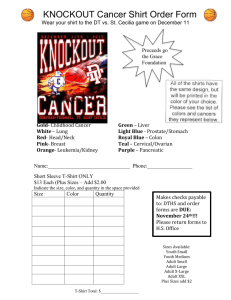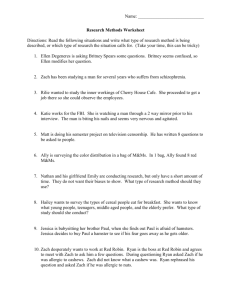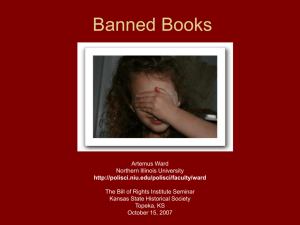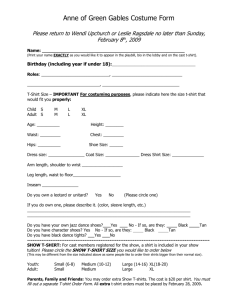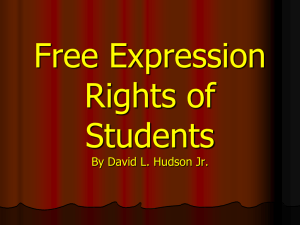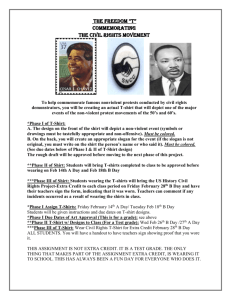Free Speech and Student Rights
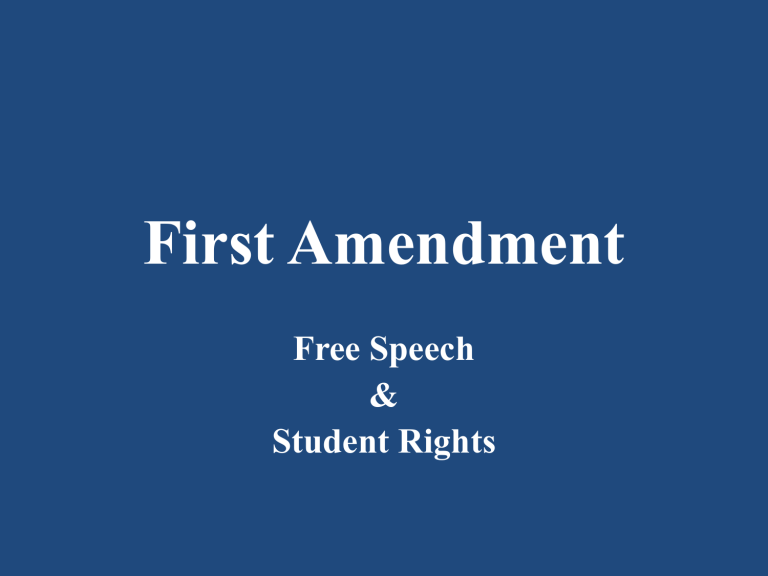
First Amendment
Free Speech
&
Student Rights
First Amendment
Congress shall make no law respecting an establishment of religion, or prohibiting the free exercise thereof; or
abridging the freedom of speech,
or of the press; or the right of the people peaceably to assemble, and to petition the government for a redress of grievances.
What kind of ‘speech’ does the
1
st
Amendment protect?
•
Written words
•
Spoken words
•
Expressive conduct – actions that do not involve written or spoken words but do contain a message
Tinker v. Des Moines
Mary Beth and John Tinker
In 1965, 13 year old Mary Beth Tinker and 15 year old John Tinker attended an anti-Vietnam War meeting. The attendees decided to publicize their objections to the hostilities in Vietnam by wearing black armbands during the holiday season and by fasting on December 16 and New Year's Eve.
When the principals of the Des Moines schools became aware of the plan to wear armbands, they met and adopted a policy that any student wearing an armband to school would be asked to remove it; and if the student refused, he or she would be suspended until he or she returned without the armband. The
Tinkers were aware of the regulation.
On December 16, the Tinkers wore black armbands to their schools. They were sent home and suspended from school until they would come back without their armbands. They did not return to school until after the planned period for wearing armbands had expired – that is, until after New Year's Day.
Tinker v. Des Moines (1969)
• Do students have the right to political expression on school grounds?
• Does the state have the authority to restrict speech under its police powers: protect the health, safety, welfare, and morals of the people?
• Is there a difference between elementary, middle, high school, and college students for free speech purposes?
Results of Tinker
–
Students do not surrender their constitutional rights simply by entering a public school
–
The prohibition of expression of one particular opinion is not constitutionally permissible and a student has the right to express his or her opinions, even on controversial subjects.
– The school has the burden of showing that the student’s speech
“materially and substantially interfered with the requirements of appropriate discipline in the operation of the school” and without colliding with the rights of others.
Bethel S.D. v. Fraser, 1986
On April 26, 1983, Matthew Fraser, a student at Bethel High
School in Pierce County, Washington, delivered a speech nominating a fellow student for elective office. Approximately 600 high school students, many of whom were 14-year-olds, attended the assembly. Students were required to attend the assembly or to report to the study hall.
Two of Fraser's teachers, with whom he discussed the contents of his speech in advance, informed him that the speech was “inappropriate and that he probably should not deliver it,” and that his delivery of the speech might have “severe consequences.”
I know a man who is firm – he’s firm in his pants, he’s firm in his shirt, his character is firm – but most of all, his belief in you, the students of Bethel, is firm.
Jeff Kuhlman is a man who takes his point and pounds it in. If necessary, he’ll take an issue and nail it to the wall. He doesn’t attack things in spurts – he drives hard, pushing and pushing until finally – he succeeds…
Jeff is a man who will go to the very end – even the climax, for each and every one of you…So vote for Jeff for A.S.B. vice-president
– he’ll never come between you and the best our high school can be.
During the speech, a school counselor observed some students hooting and yelling and some making gestures graphically simulating the sexual activities pointedly alluded to in respondent's speech.
Others appeared to be bewildered and embarrassed by the speech.
A Bethel High School disciplinary rule prohibiting the use of obscene language in the school provided: “Conduct which materially and substantially interferes with the educational process is prohibited, including the use of obscene, profane language or gestures.”
The morning after the assembly, the Assistant Principal called
Matthew into her office and told him that the school considered his speech to have been a violation of this rule. Matthew was given a chance to explain his conduct, and he admitted to deliberately using sexual innuendo in the speech. He was then suspended for three days, and his name was removed from the list of candidates for graduation speaker.
Results of Bethel
•
Schools can censor and punish students for
“lewd, indecent or plainly offensive” speech.
–
Dictionary definitions:
–
"lewd" means "inciting to sensual desire or imagination,"
– "vulgar" means "lewd, obscene, or profane in expression,"
– and "indecent" means "being or tending to be obscene“
• Student’s first amendment rights are not equal to adult rights
Guiles v. Marineau
In 2004, Zachary Guiles, a 13-year-old student at Williamstown Middle High School in Vermont, wore a T-shirt to school that criticized President
Bush as a chicken-hawk president.
The T-shirt also accused the President of being a former alcohol and cocaine abuser. To make its point, the shirt displayed images of drugs and alcohol.
Zach Guiles wore the T-shirt on average once a week for two months. Although the shirt evoked discussion from students, it did not cause any disruptions or fights inside or outside the school.
On a school field trip, Zach wore the T-shirt. A parent who was to chaperone the trip noticed the shirt and voiced her objection to a teacher.
The teacher determined that the T-shirt, specifically the images of drugs and alcohol, violated the following provision of the school’s dress code:
Williamstown Middle High School Dress
Code
“ Any aspect of a person's appearance, which constitutes a real hazard to the health and safety of self and others or is otherwise distracting, is unacceptable as an expression of personal taste.
Example (Clothing displaying alcohol, drugs, violence, obscenity, and racism is outside our responsibility and integrity guideline as a school community and is prohibited).”
The teacher gave Zach three choices: (1) turn the shirt inside-out;
(2) tape over the images of the drugs and alcohol and the word "cocaine"; or (3) change shirts.
Zach's father came in to speak with the teacher, who reiterated that the shirt contravened dress code policy. Zach returned home with his father for the remainder of that day.
The next day, Zach came to school wearing the T-shirt. The teacher again told Zach to tape over the images, turn the shirt inside out or change shirts. Zach refused. The teacher filled out a discipline referral form and sent Zach home.
Zach wore the T-shirt to school again the next day, this time, however, with the images of drugs and alcohol and the word "cocaine" covered with duct tape. On the duct tape plaintiff had scrawled the word “Censored.”
1 st
Zach then sued the school and the school district for violating his
Amendment rights of free speech.
Is the speech protected by the 1
st
Amendment?
•
Should Zach have been allowed to wear the shirt to school?
• Did his actions threaten to create a “material and substantial interference” with the school’s effective operation?
• Did his actions involve “lewd, indecent or offensive” speech?
• Is the School District’s policy Constitutional?
Court’s Decision
Fraser does not apply - Images of a martini glass, a bottle and glass, a man drinking from a bottle, and lines of cocaine do not constitute lewd, indecent, or plainly offensive speech. The images may cause school administrators displeasure and could be construed as insulting or in poor taste. We cannot say, however, that these images, by themselves, are plainly offensive.
Tinker applies - The parties agree that Zach’s T-shirt did not cause any disruption or confrontation in the school. Nor do defendants contend they had a reasonable belief that it would.
Zach wore the T-shirt on average once a week for two months without any untoward incidents occurring. Because his T-shirt did not cause any disruption, defendants' censorship was unwarranted.
Extra Comments
* We make no holding with respect to whether images of illegal drugs and alcohol on a T-shirt that promotes drug and alcohol use could be censored under the Supreme Court's student-speech cases.
Morse v. Frederick (2007)
• On January 24, 2002, students and staff at Juneau-Douglas HS were permitted to leave classes to watch the Olympic Torch pass by. Joseph Frederick, who was late for school that day, joined some friends on the sidewalk across from the high school, off school grounds.
• Frederick and his friends waited for the television cameras so they could unfurl a banner reading "BONG HiTS 4 JESUS".
Frederick was quoted as saying he'd first seen the phrase on a snowboard sticker.
• When they displayed the banner, then-principal Deborah
Morse ran across the street and seized it.
Morse v. Frederick (2007)
Morse v. Frederick (2007)
• Morse initially suspended Frederick for five days for violating the school district's anti-drug policy, but later increased the suspension to ten days after
Frederick quoted Thomas Jefferson.
• Frederick administratively appealed his suspension to the superintendent, who denied his appeal but limited it to the time Frederick had already spent out of school prior to his appeal to the superintendent
(eight days).
• Frederick then appealed to the Juneau School Board, which upheld the suspension on March 19, 2002.
Morse v. Frederick (2007)
• Chief Justice Roberts, writing for the majority, concluded that the school officials did not violate the First Amendment.
– first, that “school speech” doctrine should apply because Frederick's speech occurred "at a school event";
– second, that the speech was "reasonably viewed as promoting illegal drug use";
– and third, that a principal may legally restrict that
Students Are Not Adults
• Despite the progressive language of Tinker, several
Supreme Court cases have established that students in public schools generally do not have the same rights as adults.
They have fewer rights to free speech, privacy, and other liberties.
• The question is how to balance children’s rights to receive information with educators’ and parents’ concern about the suitability of certain materials.
Board of Ed., Island Trees School Dis. v. Pico (1982)
• In 1976, a New York school board decided to pull a number of books from library shelves in response to a complaint by community group, Parents of New York United.
• The group said the books were “anti-American, anti-Christian, anti-Semitic and just plain filthy” and concluded that "[i]t is our duty, our moral obligation, to protect the children in our schools from this moral danger as surely as from physical and medical dangers.“
• The books in the High School library were:
– Slaughterhouse Five, by Kurt Vonnegut, Jr.;
– The Naked Ape, by Desmond Morris
– Down These Mean Streets, by Piri Thomas;
– Best Short Stories of Negro Writers, edited by Langston
Hughes;
– Go Ask Alice, of anonymous authorship;
– Laughing Boy, by Oliver LaFarge;
– Black Boy, by Richard Wright;
– A Hero Ain't Nothin' But A Sandwich, by Alice Childress;
– Soul On Ice, by Eldridge Cleaver;
– The Fixer, by Bernard Malamud (included in the curriculum of a 12th-grade literature course).
Board of Ed., Island Trees School Dis. v. Pico (1982)
• A plurality of the justices ruled against the
Board on First Amendment grounds. Justice
William Brennan (with Marshall, Stevens, and
Blackmun) held that the right to read—or receive ideas—is implied by the First
Amendment. The government, in the form of
“local school boards may not remove books from school library shelves simply because they dislike the ideas contained in those books.”
Frequently Challenged Books
• Obscenity was not at issue in Pico, but is often used to challenge books.
• The American Library Association (ALA) collects data and publishes lists of the most frequently challenged books. Between 1990 and 2000, there were 6,364 challenges reported to or recorded by the ALA:
– 1,607 were challenges to “sexually explicit” material;
– 1,427 to material considered to use “offensive language”;
– 1,256 to material considered “unsuited to age group”;
– 842 to material with an “occult theme or promoting the occult or
Satanism”;
– 737 to material considered to be “violent”;
– 515 to material with a homosexual theme or “promoting homosexuality,”
– 419 to material “promoting a religious viewpoint.”
– Other reasons for challenges included “nudity” (317 challenges),
“racism” (267 challenges), “sex education” (224 challenges, and
“anti-family” (202 challenges).
• 60% of the challenges were brought by parents, fifteen percent by patrons, and nine percent by administrators.
Top Ten Challenged Authors
1. Alvin Schwartz
2. Judy Blume
3. Robert Cormier
4. J.K. Rowling
5. Michael Willhoite
6. Katherine Paterson
7. Stephen King
8. Maya Angelou
9. R.L. Stine
10. John Steinbeck
Top Ten Most Challenged Books
1.
“And Tango Makes Three” by Justin Richardson and Peter Parnell, for homosexuality, anti-family, and unsuited to age group;
2.
“Gossip Girls” series by Cecily Von Ziegesar for homosexuality, sexual content, drugs, unsuited to age group, and offensive language;
3.
“Alice” series by Phyllis Reynolds Naylor for sexual content and offensive language;
4.
“The Earth, My Butt, and Other Big Round Things” by Carolyn Mackler for sexual content, anti-family, offensive language, and unsuited to age group;
5.
“The Bluest Eye” by Toni Morrison for sexual content, offensive language, and unsuited to age group;
6.
“Scary Stories” series by Alvin Schwartz for occult/Satanism, unsuited to age group, violence, and insensitivity;
7.
“Athletic Shorts” by Chris Crutcher for homosexuality and offensive language;
8.
“The Perks of Being a Wallflower” by Stephen Chbosky for homosexuality, sexually explicit, offensive language, and unsuited to age group;
9.
“Beloved” by Toni Morrison for offensive language, sexual content, and unsuited to age group;
10. “The Chocolate War” by Robert Cormier for sexual content, offensive language, and violence.
• Off the list this year, but on for several years past, are the “Catcher in
the Rye” by J.D. Salinger, “Of Mice and Men” by John Steinbeck and
“The Adventures of Huckleberry Finn” by Mark Twain.
